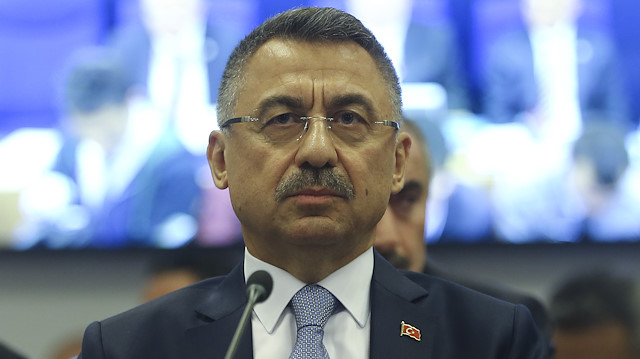

Turkey's Vice President Fuat Oktay
'The question now is who gave the orders. This is what we are seeking answers to now,' says Fuat Oktay
Reports that the body of slain Saudi journalist Jamal Khashoggi was dissolved in acid need to be investigated, Turkey's Vice President Fuat Oktay said on Monday.
"The question now is who gave the orders. This is what we are seeking answers to now," Oktay said while speaking to Anadolu Agency’s Editor Desk.
"Another question is where the body is... There are reports of (the body) being dissolved with acid now. All of these need to be looked at."
Jamal Khashoggi, a journalist critical of the Saudi state, was murdered early last month in the Saudi consulate in Istanbul. On Friday, Turkish President Recep Tayyip Erdoğan said the order to kill Khashoggi came from the "highest levels" of the Saudi government.
“Turkey is approaching the Khashoggi killing with transparency and a serious manner. It has given the message that nobody will ever attempt to commit such a murder and those who do will pay the price,” Oktay added.
U.S. sanctions on Iran
“It's not meaningful and fair to expect all countries to obey sanctions upon a country's interests. We clearly expressed our stance about the U.S. sanctions. We'll see the results of a statement to be made today,” Oktay said, referring to the sanctions re-imposed by the United States on Iran’s vital energy and banking sector.
The United States said on Friday it will temporarily allow eight importers to keep buying Iranian oil when it re-imposes sanctions on Monday aimed at forcing Tehran to curb its nuclear, missile and regional activities.
China, India, South Korea, Japan and Turkey - all top importers of Iranian oil - are among these eight countries expected to be given temporary exemptions from the sanctions to ensure crude oil prices are not destabilized.
Turkey ‘will start discussing real problems in normalization process with US’
Oktay also stated Turkey would begin discussing the thawing of ties with Washington.
“We will start discussing real problems in the normalization process with the U.S. rather than artificial problems, because this is what allies do,” the Turkish vice president said.
“Turkey's problem in relations with the U.S. were never about pastor Brunson. We did not have such a problem nor do we still think it is one,” he added, referring to American evangelical Christian pastor Andrew Brunson, who was detained in Turkey on terrorism charges. He was released last month.
Turkey to eliminate all terror threats
“The U.S. promised to eliminate the PKK/YPG in Syria’s Manbij but postponed the solution. Turkey does not have the tolerance to postpone it any further,” Oktay said.
The Manbij deal between Turkey and the U.S. focuses on the withdrawal of YPG/PKK terrorists from the city to stabilize the region, which is in the northeast of Syria's Aleppo province.
“Turkey won't tolerate any terrorist threat on its 911-kilometer long border [with Syria],” Oktay said.
“Our fight on our borders will continue until the moment no element threatening Turkey is left,” he added.
In its more than 30-year terror campaign against Turkey, the PKK -- listed as a terrorist organization by Turkey, the U.S. and the EU -- has been responsible for the death of some 40,000 people, including those of women and children. The YPG is its Syrian branch.
“Turkey will not allow any threats or any formations anywhere. Turkey has shown its determination and done what is necessary,” Oktay said.
#Turkey
#Saudi Arabia
#Iran
#US
#Jamal Khashoggi







